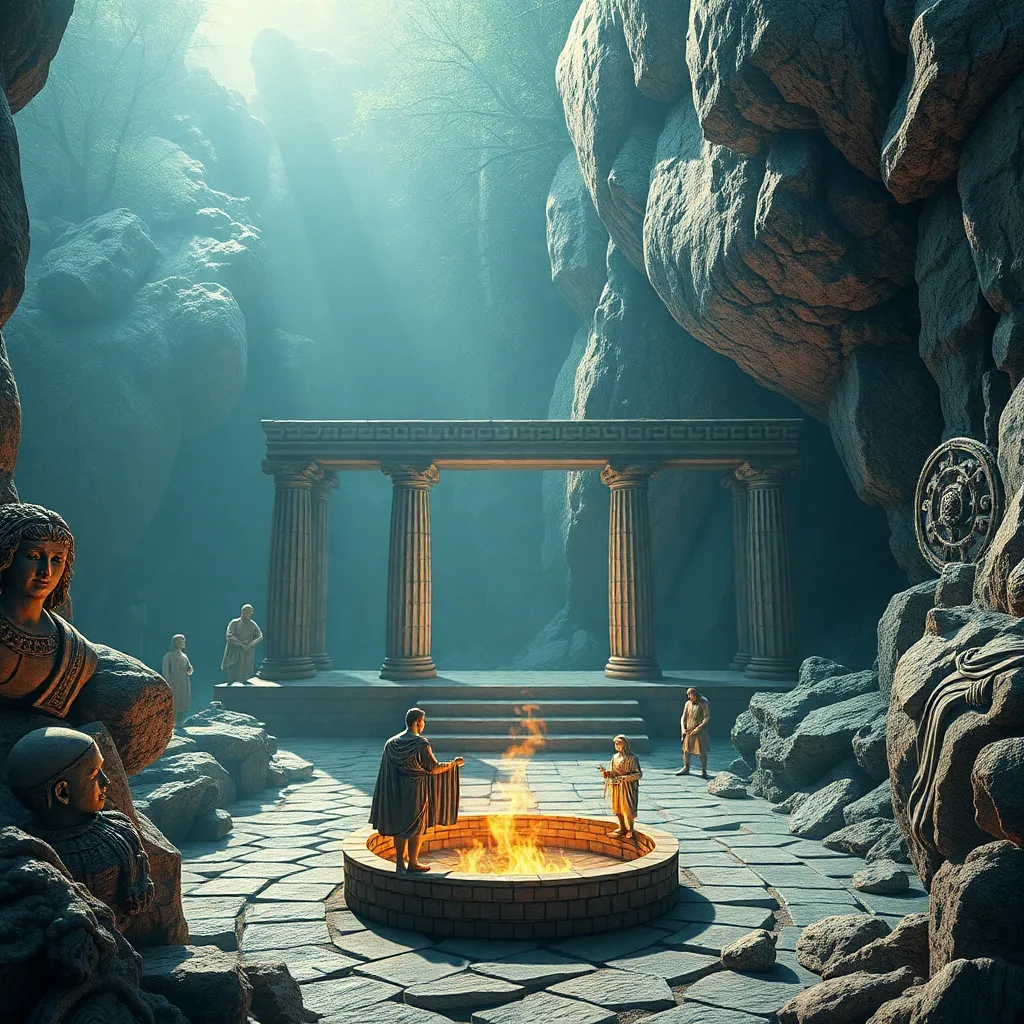The Role of Rituals in Navigating the Underworld: Ancient Greek Practices
I. Introduction
The Underworld in ancient Greek belief represents a complex realm where souls journey after death. Known as Hades, this domain is not merely a place of punishment, but rather a multifaceted environment that reflects the beliefs and values of ancient Greek society.
Rituals played a crucial role in Greek culture, serving as a bridge between the living and the dead. These practices were vital for ensuring safe passage to the Underworld and for maintaining the favor of the deities associated with death and the afterlife. This article aims to explore the significance of rituals in navigating the Underworld, their implications for the living, and their lasting legacy in modern times.
II. Understanding the Underworld in Greek Mythology
The Underworld, primarily personified by Hades, is depicted as a shadowy realm where souls reside after death. It is a place of both mystery and fear, often associated with the unknown. Hades, the god of the Underworld, rules over this domain, which contains various regions such as the Elysian Fields, Tartarus, and the Asphodel Meadows.
Key figures associated with the Underworld include:
- Charon: The ferryman who transports souls across the river Styx, requiring payment in the form of obol coins.
- Hecate: The goddess of magic and witchcraft, often invoked in rituals concerning the dead.
- Persephone: The queen of the Underworld and daughter of Demeter, whose cyclical journey between the Underworld and the world above symbolizes the changing seasons.
The concept of the afterlife in Greek mythology is deeply intertwined with the living’s actions and beliefs. It reflects the importance of honor, memory, and the legacy left behind by the deceased.
III. The Purpose of Rituals in Greek Society
In ancient Greek society, death was viewed not as an end but as a transition to another state of existence. The journey to the Underworld was fraught with challenges, and rituals were essential for ensuring a safe passage for the deceased. These ceremonies served multiple purposes:
- They provided a sense of closure for the living.
- They honored the deceased and their contributions to the community.
- They reinforced social bonds and shared beliefs among the participants.
Through these rituals, communities could express their collective identity and values regarding life and death, fostering a strong sense of belonging.
IV. Types of Rituals Associated with the Underworld
Numerous rituals were performed in relation to the Underworld, each with unique components and significance. Some of the most notable include:
A. Funerary rites and their components
Funerary rites were elaborate ceremonies that could include:
- Washing and dressing the body.
- Displaying the body for mourning.
- Burial or cremation, often accompanied by grave goods.
These rites were essential for honoring the deceased and facilitating their journey to Hades.
B. Offerings and sacrifices to appease deities
To ensure favorable treatment from Underworld deities, offerings such as:
- Food and drink.
- Flowers and wreaths.
- Libations poured on graves.
were commonly made. These gifts were believed to appease the spirits and ensure the deceased’s comfort in the afterlife.
C. Festivals celebrating the dead, such as the Anthesteria
The Anthesteria was a significant festival dedicated to the dead, occurring annually in honor of Dionysus. During this time, the living would:
- Celebrate with feasting and drinking.
- Offer sacrifices to the deceased.
- Engage in rituals to invite the spirits of the dead to partake in the festivities.
This festival exemplified the connection between the living and the dead, reinforcing communal ties and the remembrance of ancestors.
V. The Role of Mythology in Ritual Practices
Mythology served as a foundational element in the understanding of rituals associated with the Underworld. Stories such as that of Orpheus and Eurydice highlight the significance of love, loss, and the quest for redemption. These narratives provided the framework for understanding life, death, and rebirth.
Through mythology, the symbolism of the Underworld was explored, and its lessons were integrated into rituals. The interplay between myth and ritual in ancient Greek culture allowed individuals to navigate their fears and hopes concerning mortality and the afterlife.
VI. The Influence of Rituals on the Living
Participating in rituals surrounding death and the Underworld had profound psychological effects on the living. These effects included:
- A sense of connection to the deceased.
- Opportunities for communal mourning, fostering social cohesion.
- Encouragement to reflect on personal beliefs about death and the afterlife.
Rituals not only provided comfort during times of grief but also shaped community beliefs, reinforcing the idea that death is a shared human experience.
VII. Modern Interpretations and Legacy
The influence of ancient Greek rituals is still evident in contemporary practices surrounding death and mourning. Many modern ceremonies incorporate elements reminiscent of these ancient customs, such as:
- Memorial services that honor the deceased.
- Commemoration of anniversaries of death.
- Rituals that focus on celebrating life and legacy.
In today’s context, a re-examination of these ancient practices offers valuable insights into modern spirituality and the ongoing human quest to understand and navigate life’s transitions.
VIII. Conclusion
Rituals in ancient Greek society served as essential tools for navigating the complexities of the Underworld and the afterlife. By honoring the deceased and maintaining connections with the divine, these practices shaped cultural identity and community bonds.
The enduring nature of these rituals reflects a universal human experience: the desire to understand death and the hope for a meaningful existence beyond it. As we reflect on the significance of ancient practices, we gain insights that continue to resonate in our modern lives, helping us navigate our transitions with grace and understanding.




